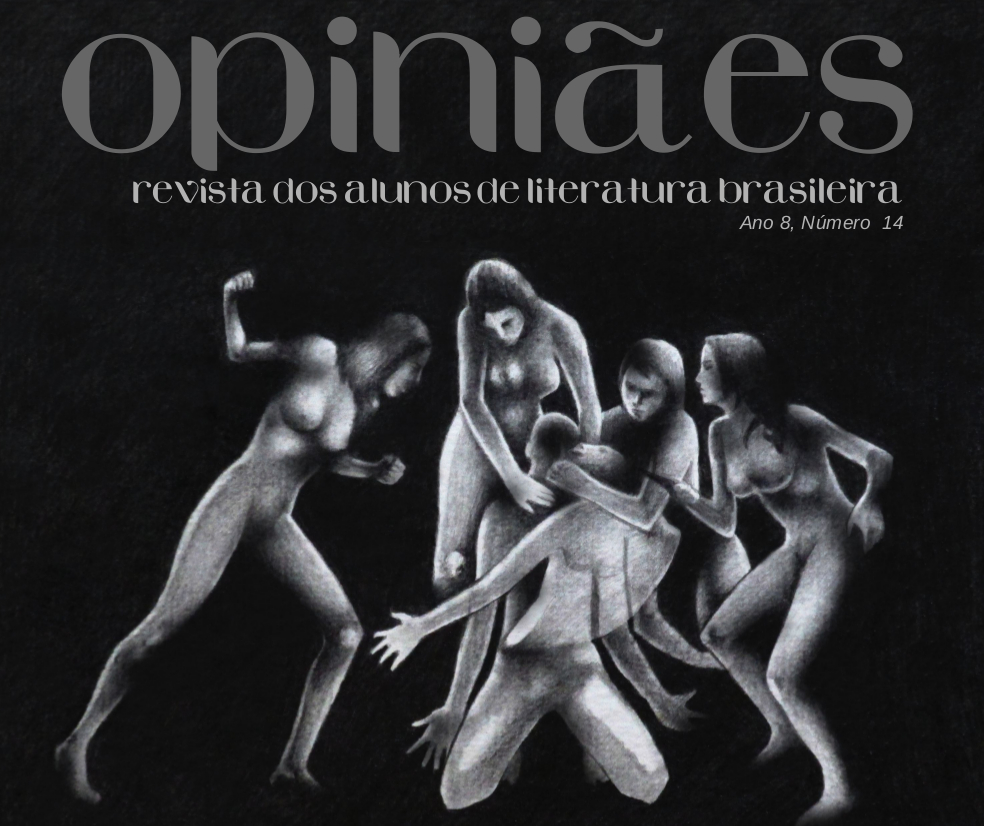To the hell of the unconsciousness
debt and guilt in the tragic configuration of the novel This Land
DOI:
https://doi.org/10.11606/issn.2525-8133.opiniaes.2019.153519Keywords:
The Land, Antônio Torres, Guilt, Tragedy, MigrationAbstract
The novel This Land dramatizes the conflict between the postive expectations concerning the progress and the way as it imposes itself through violence generating crisis, suffering, insanity and death. The outcome of Nelo’s life trajectory, character whom after twenty years living in São Paulo goes back to his birthplace and commits suicide, raises a set of issues about the meanings of the social process as well as the migration. In this article, we suggest an analysis of the tragic configuration of this novel having into account the complexity of the experience that it shapes and its ties to a broader process of imposition of the capitalist social relations, considering its particularity into the context of the national formation of Brazil. The misfortune of the characters and the conflicts that they live, external as well as internally, shapes an experience we can acknowledge as tragic as we recompose the ties between its personal and the social dimensions. We underline, mainly, the presence of the guilt to investigate the way as this novel dramatizes the constitution of the modern subject, simultaneously endowed and deprived of autonomy, aspect that seems decisive to us to grasp our contemporary tragic experience.
Downloads
References
BENJAMIN, Walter. Magia e Técnica, Arte e Política - Ensaios sobre literatura e história da cultura. Obras escolhidas, volume I, 8ª edição, São Paulo: Editora Brasiliense, 2012.
BENJAMIN, Walter. O capitalismo como religião, org. Michael Löwy; tradução Nélio Schneider, Renato Ribeiro Pompeu. São Paulo: Boitempo, 2013.
BOECHAT, Cássio Arruda. O colono que virou suco: terra, trabalho, Estado e capital na modernização da citricultura paulista. Tese (Doutorado em Geografia). Universidade de São Paulo, São Paulo, 2013.
KOSELLECK, Reinhart. Futuro passado: contribuição à semântica dos tempos históricos. Rio de Janeiro: Contraponto/PUC-Rio, 2006.
KURZ, Robert. Dominação sem sujeito: sobre a superação de uma crítica social redutora. Publicado na Revista Krisis, nº 13, 1993. Disponível em <http://www.exit-online.org>. Acessado em 05/03/2013.
KURZ, Robert. “O sentido cultural do século XXI”. Publicado na Folha de São Paulo de 28.11.1999 com o título O tédio mortal da modernidade e tradução de José Marcos Macedo. Disponível em <http://www.exit-online.org>. Acessado em 09/11/2014.
KURZ, Robert. Dinheiro sem valor. Linhas gerais para uma transformação da crítica da economia política. Lisboa: Antígona, 2014.
MARX, Karl. O Capital :crítica da economia política. Livo 1, Tomo 1. São Paulo: Abril Cultural, 1984.
SANT’ANNA, A. R. O suicídio do herói. São Paulo: Revista Veja, n. 408, p. 116, 30 jun 1976.
TORRES, Antonio. Essa Terra. São Paulo; Rio de Janeiro: Editora Record, 2014.
TORRES, Antonio. O cachorro e o lobo. Rio de Janeiro: Record, 1998.
TORRES, Antonio. Pelo fundo da agulha. Rio de Janeiro: Record, 2006.
VASCONCELOS, Sandra Guardini Teixeira. “Migrantes dos Espaços (Sertão, Memória e Nação)”. In: Letterature D'America, n. 396, Roma, 2000.
WILLIAMS Raymond. Tragédia moderna. São Paulo: Cosac Naify, 2002.
Downloads
Published
Issue
Section
License
A revista Opiniães não exerce cobrança pelas contribuições recebidas, garantindo o compartilhamento universal de suas publicações. Os autores mantêm os direitos autorais sobre os textos originais e inéditos que disponibilizarem e concedem à revista o direito de primeira publicação, com o trabalho simultaneamente licenciado sob a Licença Creative Commons Attribution que permite o compartilhamento do trabalho com reconhecimento da autoria e publicação inicial nesta revista.



